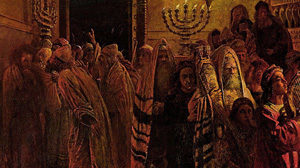Acts 1:15-17, 20a, 20c-26
1 John 4:11-16
John 17:11b-19
Reflection:
“After his suffering he presented himself alive to them by many convincing proofs appearing to them during forty days and speaking about the Kingdom of God.” Acts 1:3 It was an exciting time for the early believers. Jesus would suddenly show up alive at his tomb, or on the Lake, or especially at meal times. His followers could touch Him, plunge their hand into his wounded side, or throw their arms around Him.
The readings remind us that now no longer can we experience Jesus with our senses. “So then after the Lord Jesus spoke to them was taken up to heaven.” Mark 16:19 Now we have to relate with the Risen Jesus only by faith. Faith is the eye by which we can see Him, the hand by which we touch Him, the arms by which we embrace Him. We no longer have to wait for an unexpected visit from Jesus to our senses, but now have constant contact with Him in faith. The epistle to the Hebrews tells us that “faith is the substance of things hoped for.” Hebrews 11 The word for substance in the original Greek NT is hoop-as-tas-sis. When we approach Jesus with the arms of faith we get our hands on him in a very real and substantial way.
In this life there is no real communication with the Risen Christ outside of faith.
The Ascension does not mean Jesus is taken away from us, but now becomes accessible to us in all times and places. St. Paul of the Cross used to speak of our contacting Jesus in naked faith. Many times we do not feel Jesus present but we know by faith that we have our hand on him every bit as much as the women at the tomb had their arms around him. On earth this is the only real way of union with Christ.
Faith is a precious gift from God. We must always ask for more of it. “Lord, increase our faith.” Faith can put us deeply into the arms of the Living Christ.
Our faith can bring Christ closer to us than our wildest imagination could do. By faith we live and move and have our meaning in Him.
Fr. Bob Weiss, C.P. gives parish missions and retreats. He is a member of the Passionist community in Louisville, Kentucky.






